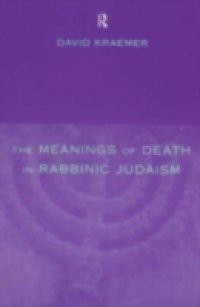There are many books devoted to explicating Jewish laws and customs relating to death and mourning and a wealth of studies addressing the significance of death practices around the world. However, never before has there been a study of the death and mourning practices of the founders of Judaism - the Rabbis of late antiquity. The Meanings of Death in Rabbinic Judaism fills that gap.The author examines the earliest canonical texts - the Mishnah, the Tosefta, the Midrashim and the Talmud of the Land of Israel. He outlines the rituals described in these texts, from preparation for death to reburial of bones and the end of mourning. David Kraemer explores the relationships between the texts and interprets the rituals to uncover the beliefs which informed their foundation. He discusses the material evidence preserved in the largest Jewish burial complex in antiquity - the catacombs at Beth Shearim. Finally, the author offers an interpretation of the Rabbis' interpretations of death rituals - those recorded in the Babylonian Talmud.The Meanings of Death in Rabbinic Judaism provides a comprehensive and illuminating introduction to the formation, practice and significance of death rituals in Rabbinic Judaism.

